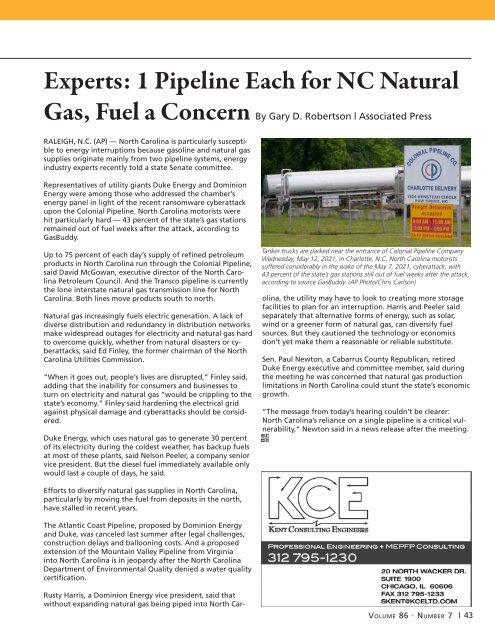CEAC-2021-07-July
You also want an ePaper? Increase the reach of your titles
YUMPU automatically turns print PDFs into web optimized ePapers that Google loves.
Experts: 1 Pipeline Each for NC Natural<br />
Gas, Fuel a Concern By Gary D. Robertson | Associated Press<br />
RALEIGH, N.C. (AP) — North Carolina is particularly susceptible<br />
to energy interruptions because gasoline and natural gas<br />
supplies originate mainly from two pipeline systems, energy<br />
industry experts recently told a state Senate committee.<br />
Representatives of utility giants Duke Energy and Dominion<br />
Energy were among those who addressed the chamber’s<br />
energy panel in light of the recent ransomware cyberattack<br />
upon the Colonial Pipeline. North Carolina motorists were<br />
hit particularly hard — 43 percent of the state’s gas stations<br />
remained out of fuel weeks after the attack, according to<br />
GasBuddy.<br />
Up to 75 percent of each day’s supply of refined petroleum<br />
products in North Carolina run through the Colonial Pipeline,<br />
said David McGowan, executive director of the North Carolina<br />
Petroleum Council. And the Transco pipeline is currently<br />
the lone interstate natural gas transmission line for North<br />
Carolina. Both lines move products south to north.<br />
Natural gas increasingly fuels electric generation. A lack of<br />
diverse distribution and redundancy in distribution networks<br />
make widespread outages for electricity and natural gas hard<br />
to overcome quickly, whether from natural disasters or cyberattacks,<br />
said Ed Finley, the former chairman of the North<br />
Carolina Utilities Commission.<br />
“When it goes out, people’s lives are disrupted,” Finley said,<br />
adding that the inability for consumers and businesses to<br />
turn on electricity and natural gas “would be crippling to the<br />
state’s economy.” Finley said hardening the electrical grid<br />
against physical damage and cyberattacks should be considered.<br />
Duke Energy, which uses natural gas to generate 30 percent<br />
of its electricity during the coldest weather, has backup fuels<br />
at most of these plants, said Nelson Peeler, a company senior<br />
vice president. But the diesel fuel immediately available only<br />
would last a couple of days, he said.<br />
Tanker trucks are parked near the entrance of Colonial Pipeline Company<br />
Wednesday, May 12, <strong>2021</strong>, in Charlotte, N.C. North Carolina motorists<br />
suffered considerably in the wake of the May 7, <strong>2021</strong>, cyberattack, with<br />
43 percent of the state’s gas stations still out of fuel weeks after the attack,<br />
according to source GasBuddy. (AP Photo/Chris Carlson)<br />
Rusty Harris, a Dominion Energy vice president, said that<br />
without expanding natural gas being piped into North Carolina,<br />
the utility may have to look to creating more storage<br />
facilities to plan for an interruption. Harris and Peeler said<br />
separately that alternative forms of energy, such as solar,<br />
wind or a greener form of natural gas, can diversify fuel<br />
sources. But they cautioned the technology or economics<br />
don’t yet make them a reasonable or reliable substitute.<br />
Sen. Paul Newton, a Cabarrus County Republican, retired<br />
Duke Energy executive and committee member, said during<br />
the meeting he was concerned that natural gas production<br />
limitations in North Carolina could stunt the state’s economic<br />
growth.<br />
“The message from today’s hearing couldn’t be clearer:<br />
North Carolina’s reliance on a single pipeline is a critical vulnerability,”<br />
Newton said in a news release after the meeting.<br />
Efforts to diversify natural gas supplies in North Carolina,<br />
particularly by moving the fuel from deposits in the north,<br />
have stalled in recent years.<br />
The Atlantic Coast Pipeline, proposed by Dominion Energy<br />
and Duke, was canceled last summer after legal challenges,<br />
construction delays and ballooning costs. And a proposed<br />
extension of the Mountain Valley Pipeline from Virginia<br />
into North Carolina is in jeopardy after the North Carolina<br />
Department of Environmental Quality denied a water quality<br />
certification.<br />
Volume 86 · Number 7 | 43


















